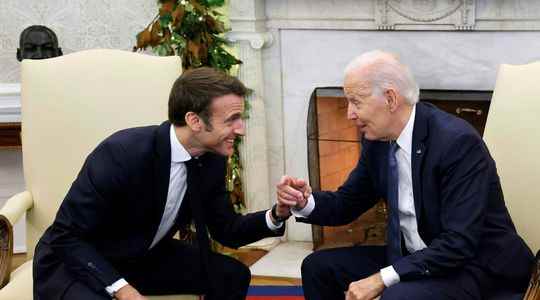On the occasion of Emmanuel Macron’s first state visit to the United States under the administration of US President Joe Biden, the two leaders ostensibly displayed their friendship. One year after the serious diplomatic quarrel linked to the creation of the Aukus military alliance (between the United States, Australia and Great Britain) and the loss by France of a mega contract for the sale of submarines , the page seems turned according to Tara Varma, director of the Paris office of the European Council on Foreign Relations (ECFR). And this, even if the visit had started with criticisms of the French president against the Inflation Reduction Act, a set of measures containing in particular large subsidies for American companies.
L’Express: What is the outcome of Emmanuel Macron’s state visit to the United States?
Tara Varma: In my opinion, the results of this visit are rather positive. Difficult subjects, such as the Inflation Reduction Act and its protectionist dimension, were tackled frankly and without beating around the bush. This can therefore constitute a first reason for satisfaction for France. Then, we also measure through this visit, and the good understanding displayed between the two presidents, the path that has been traveled since the Aukus crisis, and the unprecedented diplomatic quarrel that this security pact had caused.
The resumption of relations between France and the United States has been punctuated by several stages, of which this state visit constitutes the culmination. Beyond the personal relationship between Emmanuel Macron and Joe Biden, which seems quite friendly, we feel that there has been a year of work on substantive issues. In the wake of the Aukus scandal, a number of discussion platforms have been set up to strengthen dialogue between Washington and European capitals.
On the economic front, Emmanuel Macron did not seem to win any concrete concessions from Washington regarding the Inflation Reduction Act…
No, indeed, but it seemed difficult. This massive investment plan, which notably provides subsidies for American industrialists, is a crucial file for the White House, destined to become one of the cornerstones of Joe Biden’s policy. So it seemed quite unrealistic to think that the American president was going to give it up.
However, there was a fairly open discussion on how we could move forward together and contain distortions of competition as much as possible, so that this plan does not excessively favor American companies over European companies. The Trade and Technology Council (TCC), which was created in 2021 and brings together the United States and the European Union, is precisely responsible for discussing this type of question. It can therefore be expected that accommodations will be found in the near future.
How does the Biden administration see Emmanuel Macron?
She sees him more and more as a sometimes a little turbulent, but indispensable partner. During the presidency of Barack Obama, the United States considered that Germany was their privileged interlocutor in Europe and that it was therefore towards Angela Merkel that it was necessary to turn. This was due to the economic and political centrality of Germany on the European continent, but also to the capacity of this country to negotiate with both Eastern and Western Europe.
But this positioning has since evolved. New Chancellor Olaf Scholz only recently took office, and he is less critical of China than Americans would have hoped. In fact, the United States is now turning more to France and Emmanuel Macron. In addition, Paris represents for Washington an important partner in military terms and cooperation in the field of intelligence. France is also today the only country with nuclear weapons within the European Union, which gives it a special responsibility in the protection of the European continent. As such, the Americans say to themselves that it is important to develop an even closer relationship with France.
Was the good understanding between the two presidents also a means of displaying Western unity in the context of the war in Ukraine?
Absolutely, and I think that was an important dimension. The two Heads of State took the opportunity to reaffirm their unity and the solidity of the transatlantic relationship in the context of the war in Ukraine. This is a fundamental question for Europeans who still expect Americans to ensure part of their security.
For their part, the United States expects a form of alignment of the Europeans on their positions concerning China. I don’t think the Europeans are ready to accept it, even if it is obvious that they will always remain on the side of the Americans. But we also have economic relations with Beijing, which make it difficult to completely distance yourself from China.
